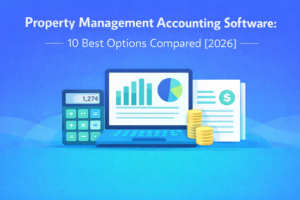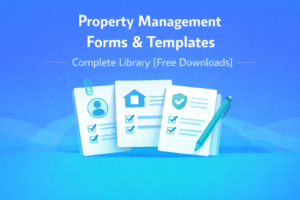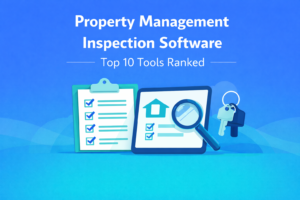
The Importance of Trust Accounts in Property Management: What You Need to Know
A property management trust account can offer significant benefits if you’re a real estate agent or investor. These financial accounts hold money for others, protecting transactions.
In real estate, trust accounts are beneficial, and in this blog post, we’ll explore the top benefits of using trust accounts for rental transactions.
Whether collecting rent or buying/selling properties, a trust or escrow account ensures proper funds tracking. Let’s understand more about trust accounts in property management!
What Is a Trust Account?
A trust account is basically like a special bank account for real estate. Instead of mixing all your money together, it keeps your property finances separate from your personal or business funds.
It’s handy because it helps you keep track of the money coming in and going out for each property you own. This makes it easy to stay organized, manage your accounting, and see how each investment is doing independently.
Here’s a big plus: it adds an extra layer of safety for your money. Because it follows specific rules, it protects your property funds from getting mixed up in personal problems or other business messes.
In simple terms, a trust account is just a special bank account that real estate folks use to handle property money separately, which makes everything easier to manage and keeps your investments safer.
Need for Trust Accounts in Property Management
You might be wondering why trust accounting is important for property management. Well, the answer is simple. When managing properties for others, handling their money becomes a big deal. To make your life easier, using a single trust account for all that money is a smart move.
It means less hassle–no juggling multiple accounts or spending lots of time sorting through transactions. Keeping your money separate from your clients’ cash is crucial; having a clear distinction helps avoid confusion.
But let’s be real; ensuring they’re set up correctly can be challenging. Risks involved may not be evident initially, like unauthorized access to funds, fraud, or mishandling of sensitive information.
So, it’s crucial to be diligent and have robust security measures to deal with these risks effectively. By staying alert and monitoring trust accounts, you can keep your business on track and build trust with your clients.
Challenges in Setting Up Trust Accounts
Setting up a trust account for property management can be quite a juggling act. First of all, there are strict legal rules you have to follow, and if you miss the mark on compliance, you could end up facing penalties or legal trouble.
And let me tell you, keeping track of all the money flowing in and out requires some meticulous accounting – any slip-ups, and you might find yourself dealing with audits or financial messes.
Also, expect thorough paperwork. Managing trust accounts involves handling receipts, bank statements, and records, which can be an organizational headache. But it doesn’t have to be. You can reduce paperwork and increase productivity by using efficient property management software like Propertese.

And let’s remember the banking side. Trust accounts have strict rules, and nailing them requires serious banking know-how. It’s not just crunching numbers; it’s about people, too. Ensuring tenants and property owners understand how their funds are handled is crucial.
Lastly, it’s important to ensure that the team handling these accounts is well-trained and up-to-date is super important. Otherwise, mistakes and non-compliance can easily creep in. So, overall, it’s a delicate task to be done, and good software can make things much easier for you.
Advice for Setting Up Trust Accounts
If you need more certainty or have doubts about managing your trust accounts, it’s highly recommended that you contact your bank. Take the time to explain what these accounts are for and how they differ from regular business accounts.
It’s crucial to ensure your bank fully understands that these funds don’t belong to you personally or the company. By providing this additional context, you can establish a clear understanding and avoid any potential confusion or misunderstandings.
Ask your bank questions like:
How much money in my trust accounts is insured separately from other company money?
Would the bank freeze my trust account if the IRS said I owed money?
Does the bank have records of the people whose money is in my trust accounts?
You’ll know if your accounts are set up correctly depending on the answers. If things need to be clarified, talk to the bank’s compliance department. And if needed, find a bank that understands these types of accounts well.
Tips for Smooth Property Management Trust Account
Know the Rules
Regarding property management and trust accounts, having a good grasp of the legal aspects is like building a solid foundation for your real estate ventures.
Remember that regulations can differ from one place to another, so it’s essential to delve into the specifics of your local laws. In California, property managers who handle trust accounts must follow specific guidelines set by the Department of Real Estate.
This knowledge isn’t just about following the rules; it’s about protecting the interests of everyone involved. It ensures that you handle finances ethically and securely.
Tech Assistance
Technology can be your best friend in streamlining trust account management. You can level up your game by embracing tools specifically designed for real estate, like property management software or platforms such as Propertese.

These fantastic tools simplify all the nitty-gritty tasks, from rent collection to expense tracking, freeing you from tedious manual work. Plus, automation not only saves you time but also minimizes errors, allowing you to focus your energy on making strategic decisions without getting caught up in administrative chaos.
Internal Checks
When it comes to your operations, setting up a strong system of checks and balances is like having an internal watchdog for your trust account. You need detailed records of transactions and strict checks to be the backbone here.
They act as a safety net, preventing mistakes or unauthorized access that could risk the account’s integrity. And remember, transparency within your team is critical. It promotes accountability and strengthens your defenses against any potential issues.
Communicate Clearly
When communicating with tenants, it’s not just about being friendly – it’s about setting the stage for a smooth relationship. So, let’s talk about some important things.
First, we need to discuss payment expectations. It’s important to be clear about what’s expected and when. Next, let’s clarify lease terms and any additional fees. We want to ensure everyone is on the same page and there are no surprises down the road.
Being upfront and transparent about everything reduces the chances of misunderstandings or disputes later. Let’s keep the lines of communication open.
Regular Updates
Just picture your trust account system as a well-oiled machine. It needs regular check-ups to stay in tip-top shape, you know? Industry standards and regulations can change, so staying on top of these updates is important.
Proactively reviewing and updating your system ensures transparency and that your operations are efficient and up-to-date. Therefore, keep that proactive mindset and keep your system running smoothly.
Final Thoughts
In the world of real estate, trust accounts are like strong pillars that provide financial security and keep everything organized. Although they can be challenging to set up and manage, their benefits in safeguarding investments and streamlining finances are undeniable.
Property management trust account becomes a powerful asset in successfully handling properties by understanding the regulations, using technology, implementing checks, maintaining clear communication, and staying updated.
Mastering trust accounts ensures security and brings efficiency in navigating the complexities of real estate finances. So, it’s essential to stay on top of them.
Table of Contents
Stay Updated
Subscribe to get the latest news, industry trends, blog posts, and updates...




